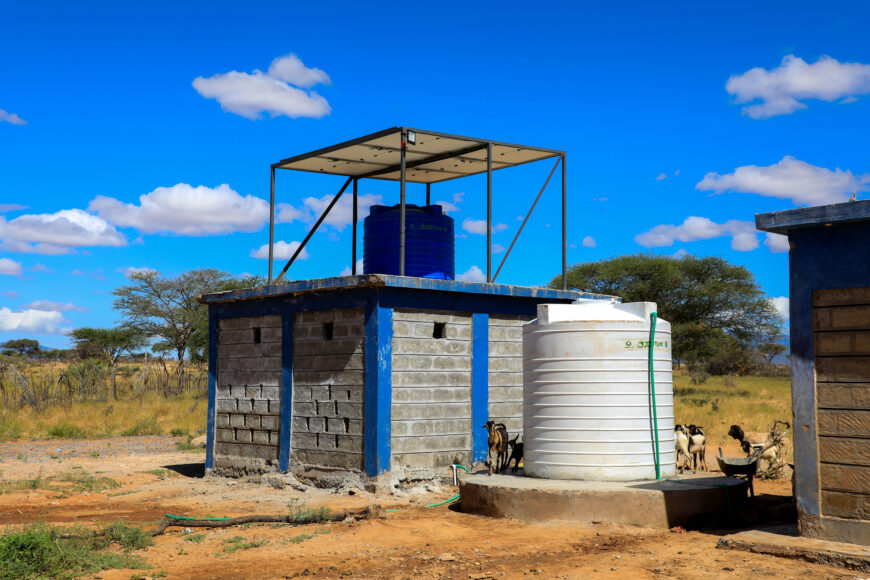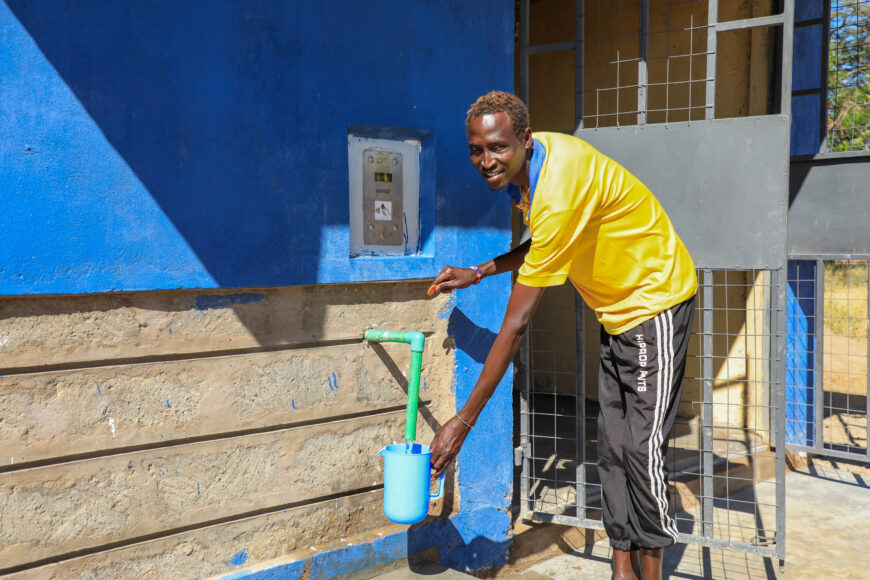Kenya: Desalinating salty water for Samburu communities
Clean water is vital for human health and survival, and access to water is recognized as a human right. By March 2023, it is estimated that at least 74% of people in the world had access to safely managed drinking water although there are still around 2 billion people around the world without access to safely managed drinking water, with a large number concentrated in Sub-Saharan Africa.
Making water more drinkable for households and school children
Thanks to joint funding from the French municipalities of Yvelines, Sicasil, Toulouse and the Communauté d’Agglomération du Pays de Saint-Omer (CAPSO), Acted undertook to desalinate water that had been consumed by 333 vulnerable households in Sere Olipi, with the aim of improving their access to safe drinking water. The 2,000 community members attested to never tasting salt-free water before and were quite curious on how desalinated water would taste.
What is water desalination ?
Water desalination is the process of separating salt from a saline solution to turn it into water that is suitable for human consumption, or agricultural use.
The desalination process takes place in desalination plants/units and comprises of several phases including:
- Withdrawal of brackish water.
- Pre-treatment: during this phase, the physico-chemical and biological properties of the water are adapted for treatment in the desalination plant.
- Desalination: this is the main phase, during which desalination techniques using membranes, distillation or evaporation are used.
- Post-treatment: desalinated water is treated to correct water hardness and low alkalinity, generated during the previous phases.
In the case of Sere Olipi, desalination was carried out using reverse osmosis, part of the membrane technology.
A taste of fresh water at last
The ingestion of too much salt through water has proven to have harmful effects on health. Water high in salinity is known to cause kidney stones, high blood pressure and heart problems.
Both at school and at home, students of Sere Olipi Mixed Day Secondary School had been experiencing the same taste for years, and the effects of the saline water were beginning to be felt on their health.
With a water kiosk that has the potential of converting 5,000 liters of salty water into fresh water, there is a glimmer of hope for students who will have clean and safe water at school. Clean water will also help retain students at school.
Just a few metres from the school is another water point, newly built by Acted; the Sere Olipi Maji Safi Water Kiosk. Water is sold to neighboring households using a token system for less than a dollar per 20-liter jerrican, with the profits going towards maintaining the unit in case of breakdowns. Money paid is loaded as tokens on to electronic gadgets provided to the community, that are used to release the water proportionate to the liters that have been purchased.
The proceeds also pay a monthly stipend to the operators as agreed by the water management committee and the community. The group also dreams of giving back to the community once they realize growth from proceeds of the water.
“We would like to one day get to a position of being able to pay school fees for one or two needy children in this community as a way of solving some of the perennial issues that affect this community.” said Lerodop*[1], the water committee treasurer.
In response to the climate-related crisis, Acted is providing WASH assistance for vulnerable populations, focusing on the rehabilitation of strategic water points at communal and institutional levels. Acted also provides capacity-building, logistical support, and tools to the borehole rapid response teams (BRRTs), as part of its commitment to strengthening the existing structures at community level and ultimately contributing to the sustainability of its interventions.
In previous years, Acted has implemented a range of safe drinking-water, sanitation and hygiene (WASH) projects with various partners. 25 boreholes have been rehabilitated and are now accessible to almost 60,000 people in the Arid and Semi-Arid Land (ASAL) areas. Other WASH interventions included the construction of hand-washing stations in institutional facilities, the distribution of hygiene kits and sanitary towels, and hygiene awareness-raising.
Through its WASH interventions over the past three years, Acted has reached a total of 122,585 people in Kenya alone.
[1] The name has been changed to protect the identity of the beneficiary.

